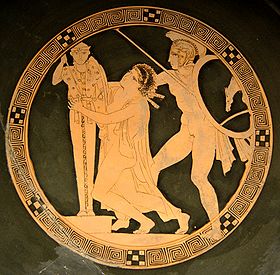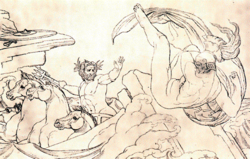Ajax the Lesser


- For other uses of this name, see Ajax.
Ajax (Greek: Αἴας) was a Greek mythological hero, son of Oileus, the king of Locris. He was called the "lesser" or "Locrian" Ajax,[1] to distinguish him from Ajax the Great, son of Telamon. He was the leader of the Locrian contingent during the Trojan War. He is a significant figure in Homer's Iliad and is also mentioned in the Odyssey.[2] In Etruscan legend, he was known as Aivas Vilates.
Contents |
Mythology
His mother's name was Eriopis. According to Strabo he was born in Naryx in Locris,[3] where Ovid calls him Narycius Heros.[4] According to the Iliad,[5] he led his Locrians in forty ships against Troy.[6] He is described as one of the great heroes among the Greeks. When the grammatical dual form of Ajax is used in the Iliad, it was once believed that it indicated the lesser Ajax fighting side-by-side with Telamonian Ajax, but now it is generally thought that that usage refers to the Greater Ajax and his brother Teucer. In battle he wore a linen cuirass (λιμνοθώρηξ), was brave and intrepid, especially skilled in throwing the spear, and, next to Achilles, the swiftest of all the Greeks.[7]
In the funeral games at the pyre of Patroclus he contended with Odysseus and Antilochus for the prize in the footrace; but Athena, who was hostile towards him and favored Odysseus, made him stumble and fall, so that he won only the second prize,[8] On his return from Troy, his vessel was wrecked on the Whirling Rocks (Γυραὶ πέτραι), but he himself escaped upon a rock through the assistance of Poseidon, and would have been saved in spite of Athena, but he said that he would escape the dangers of the sea in defiance of the immortals. In punishment for this presumption, Poseidon split the rock with his trident, and Ajax was swallowed up by the sea.[9]
In later traditions this Ajax is called a son of Oileus and the nymph Rhene, and is also mentioned among the suitors of Helen.[10][11] After the taking of Troy, it is said he rushed into the temple of Athena, where Cassandra had taken refuge, and was embracing the statue of the goddess as a supplicant. Ajax violently dragged her away to the other captives.[12][13][14][15] According to some writers he even raped Cassandra in the temple.[16][17][18] Odysseus, at least, accused him of this crime, and Ajax was to be stoned to death, but saved himself by establishing his innocence with an oath.[19] The whole charge was sometimes said to have been an invention of Agamemnon, who wanted to have Cassandra for himself.
Death
Whether true or not, Athena still had cause to be indignant, as Ajax had dragged a supplicant from her temple. According to Apollodorus, no-one had realised that Ajax had raped Cassandra until Calchas, the Greek seer, warns the Greeks that Athena is furious at the treatment of her priestess and she will destroy the Greek ships if they don't kill him. Despite this, Ajax manages to hide in the altar of an unnamed deity where the Greeks, fearing divine retribution should they kill him and destroy the altar, allow him to live. When the Greeks leave without killing Ajax, despite their sacrifices Athena is so angry that she persuades Zeus to send a storm that sinks many of their ships. When Ajax finally leaves Troy, Athena hits his ship with a thunderbolt, but Ajax still survives, managing to cling onto a rock. Athena then gets Poseidon to split the rock from below with his trident, causing Ajax to eventually drown. Thetis buries him when the corpse washes up on Myconos[20]. Other versions depict a different death for Ajax, showing him to die when on his voyage home. In these versions, when Ajax comes to the Capharean Rocks on the coast of Euboea, his ship was wrecked in a fierce storm, he himself was lifted up in a whirlwind and impaled with a flash of rapid fire from Athena in his chest, and his body thrust upon sharp rocks, which afterwards were called the rocks of Ajax.[15][21]
After his death his spirit dwelled in the island of Leuce.[22] The Opuntian Locrians worshiped Ajax as their national hero, and so great was their faith in him that when they drew up their army in battle, they always left one place open for him, believing that, although invisible to them, he was fighting for and among them.[22][23] The story of Ajax was frequently made use of by ancient poets and artists, and the hero who appears on some Locrian coins with the helmet, shield, and sword is probably this Ajax.[24]
Other accounts of his death are offered by Philostratus and the scholiast on Lycophron.[25][26]
Art
The abduction of Cassandra by Ajax was frequently represented in Greek works of art, for instance on the chest of Cypselus described by Pausanias and in extant works.[27]
References
- ↑ Homer, Iliad ii. 527
- ↑ Schmitz, Leonhard (1867), "Ajax (2)", in Smith, William, Dictionary of Greek and Roman Biography and Mythology, 1, Boston: Little, Brown and Company, pp. 87–88, http://www.ancientlibrary.com/smith-bio/0096.html
- ↑ Strabo, ix. p. 425
- ↑ Ovid, Metamorphoses xiv. 468
- ↑ Homer, Iliad ii. 527, &c.
- ↑ Gaius Julius Hyginus, Fabulae 97 gives the number of ships as twenty
- ↑ Homer, Iliad xiv. 520, &c., xxiii. 789, &c.
- ↑ Homer, Iliad (xxiii. 754, &c.
- ↑ Homer, Odyssey iv. 499, &c.
- ↑ Gaius Julius Hyginus, Fabulae 81, 97
- ↑ Apollodorus, iii. 10. § 8
- ↑ Virgil, Aeneid ii. 403
- ↑ Euripides, Troad. 70, &c.
- ↑ Dict. Cret. v. 12
- ↑ 15.0 15.1 Gaius Julius Hyginus, Fabulae 116
- ↑ Tryphiodorus, 635
- ↑ Quintus Smyrnaeus, xiii. 422
- ↑ Lycophron, 360, with the Scholion
- ↑ Pausanias, Description of Greece x. 26. § 1, 31. § 1
- ↑ Apollodore, R. Scott Smith, Stephen Trzaskoma, and Hygin. Apollodorus' Library and Hyginus' Fabulae: Two Handbooks of Greek Mythology. Indianapolis: Hackett Pub., 2007. 84-85. "5.24-6.6." Print.
- ↑ comp. Virgil, Aeneid i. 40, &c., xi. 260
- ↑ 22.0 22.1 Pausanias, Description of Greece iii. 19. § 11
- ↑ Conon Narrations 18
- ↑ Théodore Edme Mionnet, No. 570, &c.
- ↑ Philostratus, Her. viii. 3
- ↑ Scholiast on Lycophron l. c.
- ↑ Pausanias, Description of Greece v. 17
Sources
- This article incorporates text from the public domain Dictionary of Greek and Roman Biography and Mythology by William Smith (1870).
 This article incorporates text from a publication now in the public domain: Chisholm, Hugh, ed (1911). Encyclopædia Britannica (Eleventh ed.). Cambridge University Press.
This article incorporates text from a publication now in the public domain: Chisholm, Hugh, ed (1911). Encyclopædia Britannica (Eleventh ed.). Cambridge University Press.
|
||||||||